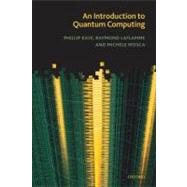
| Preface | |
| Introduction and background | |
| Linear algebra and the Dirac notation | |
| Qubits and the framework of quantum mechanics | |
| A quantum model of computation | |
| Superdense coding and quantum teleportation | |
| Introductory quantum algorithms | |
| Algorithms with super-polynomial speed-up | |
| Algorithms based on amplitude amplification | |
| Quantum computational complexity theory and lower bounds | |
| Quantum error correction | |
| Appendices | |
| Bibliography | |
| Index | |
| Preface | |
| Introduction and background | |
| Linear algebra and the Dirac notation | |
| Qubits and the framework of quantum mechanics | |
| A quantum model of computation | |
| Superdense coding and quantum teleportation | |
| Introductory quantum algorithms | |
| Algorithms with super-polynomial speed-up | |
| Algorithms based on amplitude amplification | |
| Quantum computational complexity theory and lower bounds | |
| Quantum error correction | |
| Appendices | |
| Bibliography | |
| Index | |
| Table of Contents provided by Publisher. All Rights Reserved. |
The New copy of this book will include any supplemental materials advertised. Please check the title of the book to determine if it should include any access cards, study guides, lab manuals, CDs, etc.
The Used, Rental and eBook copies of this book are not guaranteed to include any supplemental materials. Typically, only the book itself is included. This is true even if the title states it includes any access cards, study guides, lab manuals, CDs, etc.